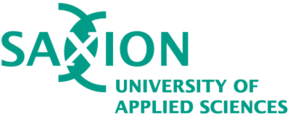Fashion & Textile Technologies

Calling all ambitious textiles trailblazers! Join us on the Fashion & Textile Technology degree course and equip yourself with the necessary skills to spearhead the transformation of a dynamic global industry. Learn about sustainable materials and innovate with boundless creativity using the latest technologies, from 3D printing to data analytics. Become an international supply chain and circularity expert, ready to drive the positive changes so urgently needed by both people and planet. This is the future of textiles and we are here to get you off to a flying start as a global pioneer.
This unique and versatile programme goes through the whole circle from raw material to finished product and back again. You will learn how traditional textile materials are made and how they can be used in new ways. Is it possible, for example, to charge your smartphone through your sportswear? You will source products from partners abroad, develop new, more sustainable materials and build a collection. You will also come up with and implement ideas on recycling.
You will be trained to become a sustainable textile specialist, in four years. Throughout the programme you will be encouraged to immediately apply theory to practical settings.
The first year of hbo Fashion & Textiles Technologies is divided into four projects; the first you conduct by yourself, the other three in groups. This gives you a good and realistic picture of the profession. You will visit companies, develop a collection, work on textile innovations and discover what goes into making clothes and textiles. Each quarter, you also take some subjects that support the overall F&TT study.
The following themes are central to the programme:
- Into the Future. You will investigate what your interests and qualities are, what the study programme has to offer and what your future work field as an F&TT professional looks like.
- Collection. How do you develop a collection that is commercial, marketable, sustainable, profitable and fits the target group? You start by researching the target group and the market. You also look at social and fashion trends, which you then translate into usable ideas, concepts and designs.
- Buying. What does the supply chain of the fashion and textile industry look like and what do you have to take into account as an international buyer? How do you ensure a balance between people, planet and profit?
- Materials. Brainstorming, innovation and sustainability are key here. Once you have come up with an innovative idea, you will research the market to see whether the idea is feasible. Then you will work out the idea together; which material works best, how do you research it and which lab tests should you do?
- Pažymių išrašas - jei dar nesi baigęs mokyklos, būtina prisegti pažymių išrašą. Smulkesnę informaciją kaip pildyti išrašą ir kada jis reikalingas, rasi čia.
- Brandos atestatas – jei jau esi baigęs mokyklą, išrašo nereikia, užtenka anketoje prisegti savo Brandos atestatą.
Pastaba!
- Motyvacinis laiškas yra NEprivalomas dokumentas stojant į šio universiteto programas
Anglų kalbos žinias gali patvirtinti vienu iš šių būdų:
- turėti anglų kalbos pažymį Brandos atestate ir išlaikyti Anglų kalbos valstybinį egzaminą (egzamino rezultatas nėra svarbus, svarbiausia, kad jį išlaikytum)*
arba
- išlaikyti IELTS arba TOEFL testą.
*Jeigu nori pasitikrinti ar tavo anglų kalbos žinios yra pakankamos studijuoti Nyderlandų aukštosiose – suteikiame galimybę laikyti Oxford anglų kalbos testą. Nors anglų kalbos testas nėra reikalaujamas, patartina žinoti savo galimybes ir kalbos lygį.
You know all the ins and outs of textile materials, innovative production methods, putting together collections, purchasing, sales and - not unimportantly - entrepreneurship. With your product and material knowledge you are an indispensable link between the people who design, make and buy the clothing and textiles. With your diploma you can apply to national and international textile and clothing companies.
With your qualifications you can chose from a wide range of professions. You could, for example, become:
- Buyer retail. As a buyer for companies like Karl Lagerfeld or Rev'it you buy collections from different brands. You have to be able to cooperate with others, know what is going on in the market and be stress-resistant. You are well aware of trends, you know your consumers and are knowledgeable about textiles and business economics. You are on the road a lot and make sure that everything you buy is delivered to the store(s) on time.
Buyer brand. As a buyer for a brand you will be travelling a lot to visit suppliers. With the designer you look at the new collection. Then you buy the fabrics for it and check if the samples meet the requirements. As the link between the designer and the producer your knowledge about textiles, the market and the buying process is indispensable.
- Materials Engineer. As a Materials Engineer you look for possible new products or materials. You spend a lot of time in the laboratory, are well aware of the latest developments and of what is happening in the market. You are in regular contact with partners, research institutes, suppliers and clients. You could work at a research center or a company like TenCate of Rev'it.
- Product developer. As a product developer you are the connection between designer, factory and sales. You develop the collection with the designer, look at the financial feasibility with the sales department and discuss with the factory how the product can be made. You also assess the first samples of a new product. Sometimes you will see 4 or 5 samples before a garment is approved for production.
- Merchandiser. As a merchandiser you have a mainly financial responsibility. You think about questions like ‘how many are we buying, do we have enough budget to do that, where can we cut back and how much will we be left with per product?’ Merchandisers cooperate closely with the buyer/product developer and the production coordinator. If you are stress-resistant and love numbers as much as you love fashion this is the job for you.

